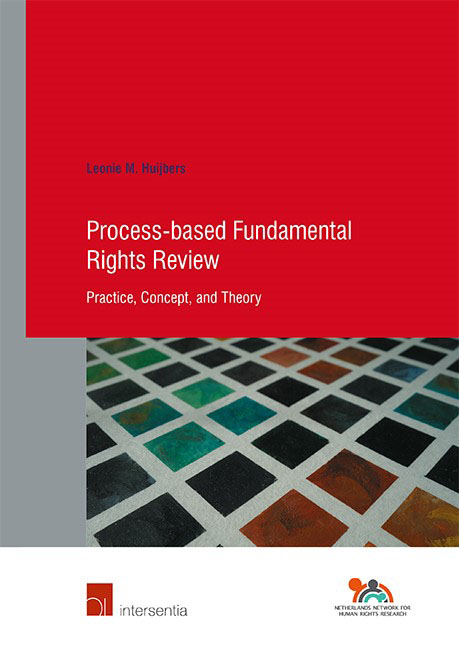Book contents
- Frontmatter
- Acknowledgments
- Contents
- List of Abbreviations
- INTRODUCTION
- PART I THE PRACTICE OF PROCESS-BASED FUNDAMENTAL RIGHTS REVIEW
- PART II THE CONCEPT OF PROCESS-BASED FUNDAMENTAL RIGHTS REVIEW
- PART III THE THEORY ON PROCESS-BASED FUNDAMENTAL RIGHTS REVIEW
- CONCLUSION
- Addendum: Questions for ECtHR Judges
- Summary
- Samenvatting
- Bibliography
- Official Documents
- Case-Law (by Jurisdiction)
- Case-Law (by Name)
- Curriculum vitae
- Human Rights Research Series
- Index
Reflection on Part III
Published online by Cambridge University Press: 11 November 2021
- Frontmatter
- Acknowledgments
- Contents
- List of Abbreviations
- INTRODUCTION
- PART I THE PRACTICE OF PROCESS-BASED FUNDAMENTAL RIGHTS REVIEW
- PART II THE CONCEPT OF PROCESS-BASED FUNDAMENTAL RIGHTS REVIEW
- PART III THE THEORY ON PROCESS-BASED FUNDAMENTAL RIGHTS REVIEW
- CONCLUSION
- Addendum: Questions for ECtHR Judges
- Summary
- Samenvatting
- Bibliography
- Official Documents
- Case-Law (by Jurisdiction)
- Case-Law (by Name)
- Curriculum vitae
- Human Rights Research Series
- Index
Summary
The previous chapters have shown the breadth, depth, and complexity of the debates on the application of process-based review in fundamental rights cases. Procedural reasoning has been advocated from various perspectives on the basis that it may contribute to the rule of law, deliberativeness in public decision-making, and the enhancement of fundamental rights protection. Process-based fundamental rights review has also been considered a means for showing institutional, normative, and epistemic judicial restraint, and for allowing courts to stay within their areas of expertise and mandate. However, others have expressed concerns about the application of procedural reasoning. The deferential nature of procedural reasoning has been questioned, as procedures have been considered the prerogative of other public authorities, and because the focus on procedures is held to cover up underlying normative decisions of courts. It has also been suggested that review of the deliberativeness of decision-making procedures endangers the deliberative democratic project and leads to reduced fundamental rights protection, as it may lead to windowdressing and delays in, and even denials of, (substantive) justice.
For reasons of clarity and structure the various debates have been addressed in separate sections and chapters. This has a downside, however, as was acknowledged in the Introduction to Part III. Certainly, the strands of the debate on the value of procedural reasoning are not as separate as the discussions in this Part suggest. Indeed, the arguments made by scholars often cross-cut the boundaries of institutional, functional, normative, and empirical discussions. This reflection therefore begins by highlighting the various ways in which the debates overlap as well as by signalling conflicts between these arguments. It closes with a summary of the main findings and conclusions of this Part.
OVERLAP AND CONFLICTS BETWEEN DEBATES ON PROCESS-BASED REVIEW
The debates on procedural reasoning have been addressed in debates concerning the institutional position (Chapter 7), function (Chapter 8), and capacities of courts (Chapter 9). Within these debates, more specific debates have been distinguished, including arguments for and against procedural reasoning in the context of the rule of law, deliberative democratic theory, and institutional restraint, as well as in the context of procedural mandates, procedural standard-setting, and substantive and procedural fundamental rights protection. Debates on process-based review also related to the neutrality of procedures, hard cases, and courts’ expertise in procedural matters and the lack thereof for dealing with epistemic uncertainties.
- Type
- Chapter
- Information
- Process-based Fundamental Rights ReviewPractice, Concept, and Theory, pp. 359 - 362Publisher: IntersentiaPrint publication year: 2021

